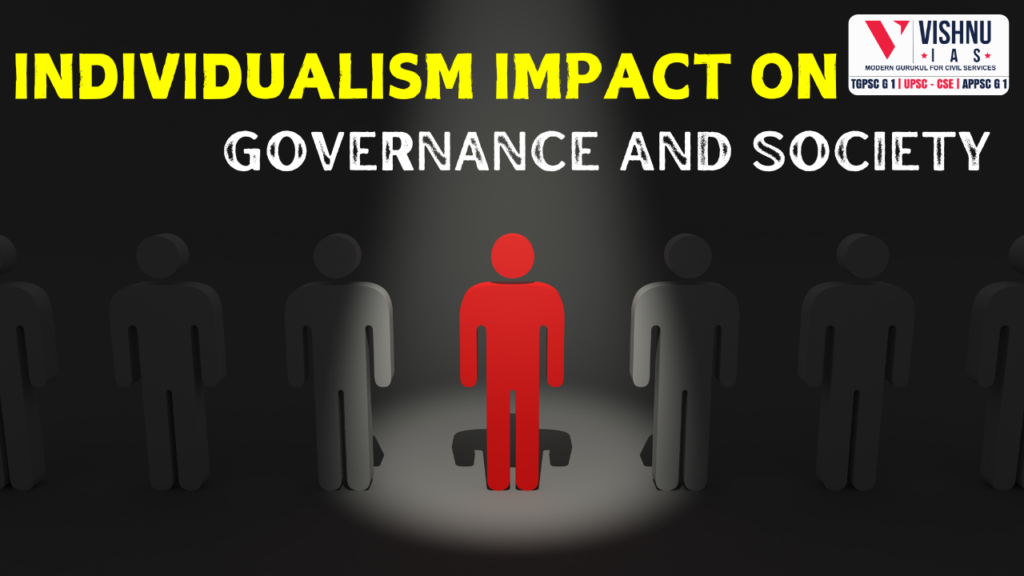Introduction:
- The collapse of traditional categories and the rise of post-individualism represent a significant shift in societal structures, affecting governance, social dynamics, and identity politics.
- Traditional categories such as gender, sex, ethnicity, and nationality have long been foundational to societal organization, shaping laws, policies, and social norms.
- The concept of post-individualism challenges these categories by emphasizing the fluidity of identity and the primacy of individual choice. This shift, driven by technological advancements and evolving social ideologies, raises complex questions about governance, social cohesion, and the pursuit of social justice.
Implications on Governance
Complexity in Policy Formulation:
The fluidity of identity categories complicates policy-making, as traditional laws and regulations are often based on fixed categories like gender and ethnicity. For instance, governments may struggle to develop inclusive policies that account for non-binary and transgender individuals.
- Case Study: In the U.S., the debate over gender-affirming care policies reflects the difficulty in creating legislation that balances individual autonomy with public health concerns.
Challenges in Identity Verification:
Traditional methods of identity verification, such as passports or birth certificates, are increasingly inadequate as individuals challenge binary classifications of sex and gender.
- Case Study: India’s Aadhaar system, which relies on biometric data, faces challenges in accommodating individuals who undergo gender transitions.
Reform of Social Welfare Systems:
- Example: The classification of Scheduled Castes and Tribes in India is under scrutiny, with debates on sub-categorization to achieve social justice goals more effectively.
Impact on Democratic Processes:
The fragmentation of identities can lead to the rise of identity-based politics, potentially polarizing electorates and complicating consensus-building in democratic systems.
- Case Study: The rise of identity-based regional political parties in India underscores the impact of identity fragmentation on electoral politics.
Regulatory Challenges in Technology:
As technology increasingly shapes identity (e.g., digital identities, social media profiles), governments face challenges in regulating these new forms of identity expression.
- Example: The use of AI in facial recognition technology raises concerns about bias and discrimination, particularly for individuals whose appearance may not conform to traditional categories.
Implications on Social Structures

Erosion of Social Cohesion:
The breakdown of traditional categories can weaken the shared social norms that underpin community cohesion, leading to social fragmentation.
- Case Study: The U.S. Supreme Court’s ruling in Bostock v. Clayton County (2020), which extended workplace protections to LGBTQ+ individuals,sparked debates about the erosion of traditional values
Reconfiguration of Family Structures:
As gender roles become more fluid, traditional family structures may evolve, impacting social stability and intergenerational relationships.
- Case Study: The legalization of same-sex marriage in India, currently under debate, could significantly alter family law and societal norms.
Shifts in Cultural Identity:
The rise of post-individualism challenges collective cultural identities, potentially leading to cultural homogenization or fragmentation.
- Example: The tension between preserving cultural traditions and embracing modern individualism is evident in many indigenous communities worldwide.
Educational System Reforms:
The fluidity of identity categories necessitates reforms in educational curricula to reflect diverse perspectives and identities.
- Example: The inclusion of LGBTQ+ history and issues in school curricula has been met with resistance in some regions, highlighting the challenges of educational reform.
- Case Study: California’s FAIR Education Act, which mandates the inclusion of LGBTQ+ contributions in textbooks, serves as a model for inclusive education.
Redefinition of Social Justice Movements:
Social justice movements must adapt to the changing landscape of identity politics, potentially redefining their goals and strategies.
- Case Study: India’s feminist movements have increasingly incorporated issues of caste, sexuality, and gender identity, reflecting a more intersectional approach to social justice.
Implications on Identity Politics

Rise of Intersectional Identities:
The collapse of traditional categories leads to the emergence of intersectional identities, complicating the landscape of identity politics.
- Example: The intersection of race and gender in the case of Kamala Harris illustrates the complexities of identity in political discourse.
Challenges to Political Representation:
As identities become more fluid, traditional forms of political representation may no longer suffice, leading to demands for more inclusive and diverse representation.
- Case Study: The election of transgender politicians in various countries, including India and the U.S., demonstrates the growing demand for diverse representation.
Polarization of Political Discourse:
The fragmentation of identities can lead to polarized political discourse, making it difficult to achieve consensus on key issues.
- Case Study: The rise of identity-based political parties in Europe, such as the National Rally in France, reflects the polarization of politics along identity lines.
Emergence of New Social Movements:
The fluidity of identity categories gives rise to new social movements that challenge traditional power structures and advocate for inclusive rights.
- Example: The global #MeToo movement has redefined the discourse on gender and power dynamics.
- Case Study: The LGBTQ+ rights movement in India, culminating in the decriminalization of Section 377, exemplifies the impact of new social movements on identity politics.
Impact on Global Governance:
The rise of post-individualism challenges global governance frameworks, particularly in areas like human rights and international law.
- Example: The debate over the rights of transgender athletes in international sports highlights the challenges of global governance in a post-individualist world.
How Governments Can Address These Challenges

Inclusive Policy Frameworks:
Governments must develop inclusive policies that recognize and accommodate the fluidity of identities while ensuring that traditional categories are not completely disregarded.
- Case Study: India’s Transgender Persons (Protection of Rights) Act, 2019, seeks to provide legal recognition and rights to transgender individuals, balancing traditional and evolving identities.
Strengthening Social Welfare Systems:
Social welfare systems must be reformed to accommodate the needs of diverse and fluid identities, ensuring that no group is left behind.
- Case Study: The Kerala government’s welfare initiatives for transgender individuals, including housing and education schemes, serve as a model for inclusive welfare.
Promoting Social Cohesion:
Governments should promote social cohesion by fostering dialogue and understanding among diverse communities, addressing the fragmentation caused by the collapse of traditional categories.
- Example: The U.K.’s Prevent Strategy, aimed at countering extremism, emphasizes community cohesion and the integration of diverse identities.
- Case Study: South Africa’s Truth and Reconciliation Commission (TRC) provides a historical example of how dialogue can bridge divides in postapartheid society.
Regulating Technology:
Regulating Technology: Governments must develop regulations that address the impact of technology on identity, ensuring that digital platforms respect privacy and prevent discrimination.
- Example: The European Union’s AI Act aims to regulate the use of AI technologies in ways that prevent bias and discrimination.
- Case Study: The controversy over Facebook’s real-name policy, which disproportionately affected LGBTQ+ individuals, highlights the need for regulations that respect diverse identities.
Conclusion
- The collapse of traditional categories and the rise of post-individualism present both challenges and opportunities for governance, social structures, and identity politics. Governments must navigate these complexities with sensitivity, ensuring that policies and regulations are inclusive and adaptive to the fluidity of identities.
- By promoting social cohesion, reforming welfare systems, and addressing the impact of technology on identity, governments can ensure that social justice and stability are maintained in an increasingly diverse and dynamic world.
- The way forward involves embracing the diversity of identities while fostering a sense of shared community and purpose, ultimately contributing to a more just and equitable society.


